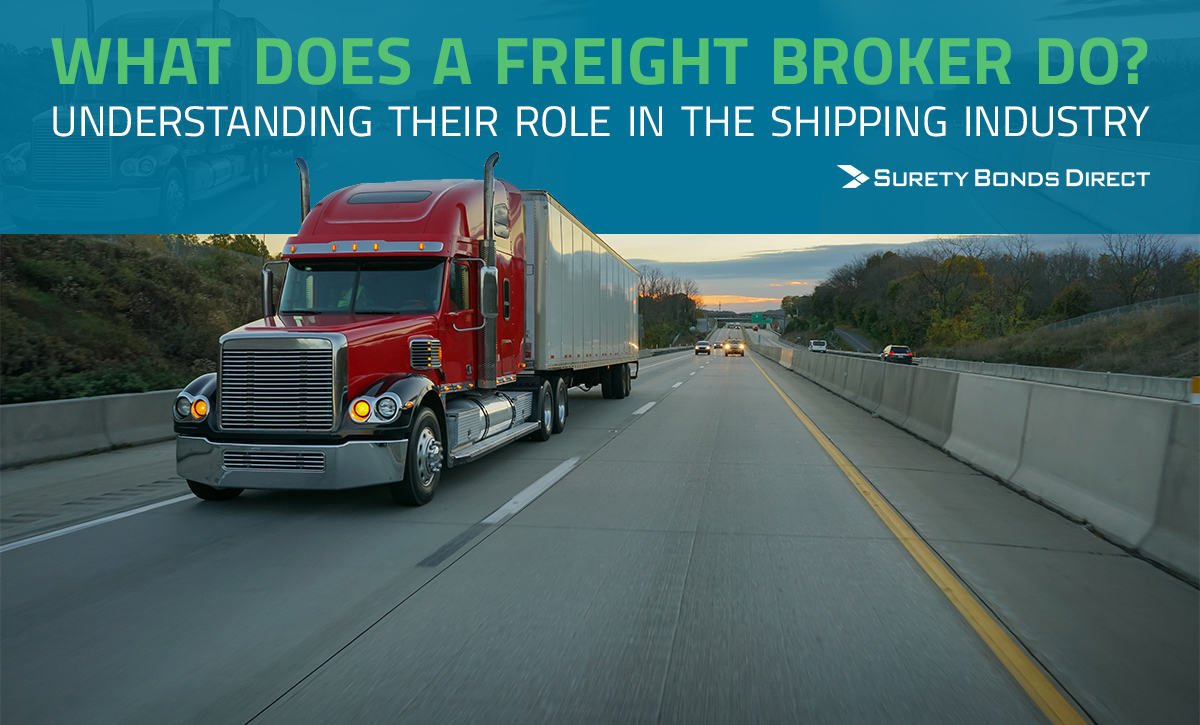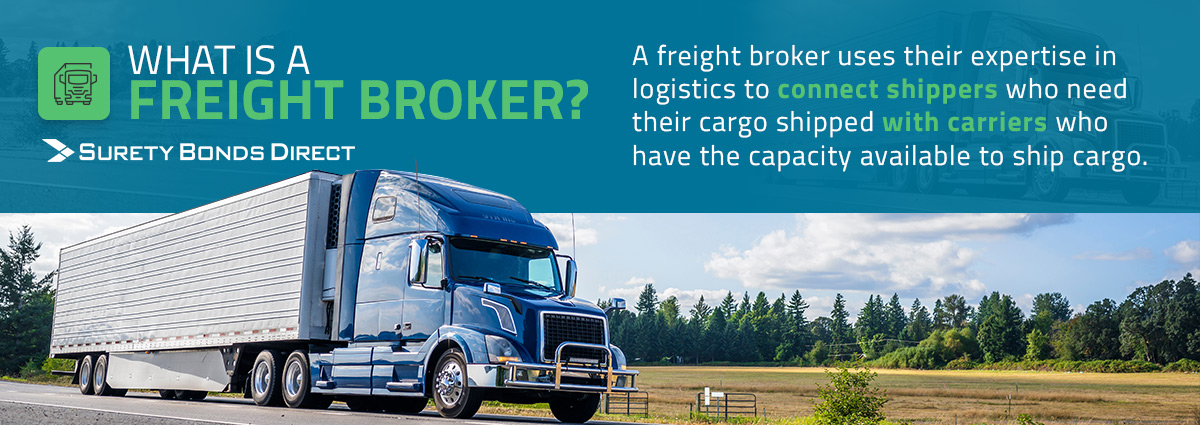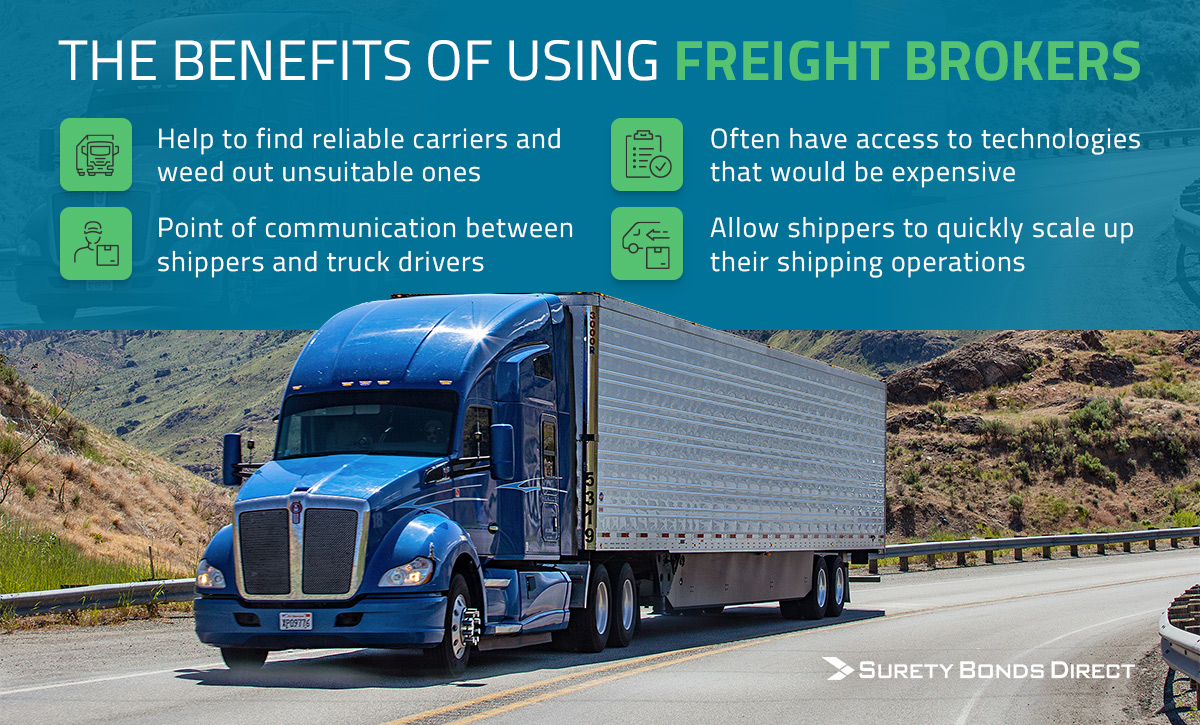What Does a Freight Broker Do?
Understanding Their Role in the Shipping Industry
Understanding what freight brokers do and the role they play in the shipping industry is crucial for anyone who’s considering getting a freight broker license.

The shipping industry has millions of moving parts. On any given day, trucks, marine vessels, container cranes, airplanes, and the many people who operate them have to work together to move goods around the US. Freight brokers help cargo owners ship their goods securely and efficiently. Brokers connect shippers with carriers, and then help navigate and coordinate the many moving parts of the supply chain to ensure that cargo gets safely to its destination. That makes freight brokers an essential part of the shipping and freight industry.
Understanding what freight brokers do and the role they play in the shipping industry is crucial for anyone who’s considering getting a freight broker license. It’s also important for shippers to know what freight brokers do so that they can understand what to expect when working with a freight broker. In this article, we’ll answer the question of “What does a freight broker do?” in more detail and discuss the freight broker’s role in keeping supply chains moving.

Freight Brokerage 101
A freight broker is a transportation intermediary, meaning that the broker owns neither the cargo being shipped nor the vehicles being used to ship it. Instead, a freight broker uses their expertise in logistics to connect shippers who need their cargo shipped with carriers who have the capacity available to ship cargo.
With demand for freight services high, thanks to the explosive growth of eCommerce, freight brokers play a critical role. They help cargo shippers navigate the complex process of finding the right carrier with the right rates. Just as importantly, freight brokers help carriers keep their fleets working at full capacity by helping them find loads to move. By applying their knowledge of logistics, freight brokers help supply chains stay in motion and continue delivering the goods that consumers and businesses rely on.
How Freight Brokers Operate
Freight brokers earn a living by taking the difference between the amount that a shipper is willing to pay to ship freight and the shipping rate that the freight broker then negotiates. This difference is called the spread. The net profits from the freight broker’s spread, after the broker’s operating expenses are deducted, provide the freight broker’s salary.
Some freight brokers work for themselves as independent contractors. Others work for freight brokerage agencies where many brokers work together. For new freight brokers starting out in the industry, working at a freight brokerage agency can provide a useful way to learn the ropes and build a working knowledge of logistics tools.

What Does a Freight Broker Do Every Day?
What does a freight broker do on an average day at their job? You might find them engaged in any or all of the following activities:
- Using their network of logistics contacts and load boards to connect shippers with carriers who will move the shipper’s cargo
- Negotiating the best shipping rates available for their clients
- Ensuring that cargo with specific needs, such as refrigerated freight, is matched with carriers with the right capacities
- Tracking shipments for their clients and making sure that cargo arrives safely at its destination
- Handling paperwork and compliance requirements for shipping various types of cargo
- Ensuring that carriers receive payment for services that they provide to shippers
- Optimizing carriers’ loads to help ensure full trucks and efficient operations
Each of the above tasks is crucial for logistics networks to operate efficiently, making freight brokers a vital element in interstate supply chains.
Why Businesses Use Freight Brokers
Why do so many businesses use freight brokers to arrange transportation for their cargo loads? Here are some of the major benefits that skilled freight brokers offer:
- Help find reliable carriers and weed out unreliable or unsuitable ones, which shippers often don’t have the time or knowledge to do.
- Serve as a point of communication between shippers and truck drivers, tracking the status of loads and providing updates in real-time.
- Often have access to technologies, such as transportation management systems (TMS) and electronic data interchange (EDI) software that would be expensive investments for shippers.
- Allow shippers to quickly scale up their shipping operations when necessary.
However, these benefits depend on finding a freight broker with the right qualifications and skills. Thus, it’s important that shippers know the relevant standards for evaluating a freight broker.

Skills That a Freight Broker Needs
A successful freight broker needs to have these skills, characteristics, and assets:
- Extensive knowledge of the standards and practices of intermodal freight shipping
- A wide network of logistics contacts and the ability to constantly cultivate new ones
- The ability to evaluate and choose legitimate, trustworthy freight carriers
- A detail-oriented approach that doesn’t allow important elements to slip through the cracks
- Knowledge of how freight rates change based on capacity, inflation, gas prices, currency fluctuations, and other factors
- The ability to think on their feet and devise innovative solutions to logistics problems
- A mindset oriented toward customer service and creating value for clients
- Strong people skills for working with both carriers and shippers
- Familiarity with and respect for the laws governing freight brokers
Freight brokers must work to cultivate these skills, and shippers should keep them in mind when evaluating a freight broker’s performance. When choosing a new freight broker to work with, shippers need to be particularly aware of the key credentials for a freight broker.
Essential Credentials for Freight Brokers
Since freight brokers operate remotely, shippers need to verify that the freight brokers they’re working with are legitimate. The minimum credentials that any freight broker should possess are:
- Registration as a freight broker with the FMCSA
- Registration with the state-level Unified Carrier Registration (UCR) database in the broker’s home state
- A BMC-84 freight broker surety bond with a coverage amount of $75,000
It’s also a good idea to look for a freight broker that carries insurance, even though freight brokers are not required by the FMCSA to be insured. Since freight brokers don’t take possession of freight, liability for the cargo still falls mostly upon the freight carrier. But when a freight broker carries insurance such as contingent cargo insurance or errors and omissions insurance, the broker demonstrates that they’ve taken appropriate steps to mitigate possible risks to the carriers and shippers that they work with.

Freight Brokers vs. Freight Forwarders
Freight forwarders are another important part of the shipping industry, and it’s understandable to wonder about the difference between a freight broker and a freight forwarder. Put simply, a freight forwarder often takes on many of the same duties as a freight broker but goes several steps further and offers several types of services that freight brokers don’t.
Unlike a freight broker, a freight forwarder takes possession of their clients’ cargo and is legally responsible for its safe arrival. A forwarder will often consolidate, assemble, and reorganize the cargo to make it easier to ship. Because they take a greater degree of ownership over cargo, freight forwarders also ship under their own bills of lading.
Freight forwarders also play a more prominent role in international freight than freight brokers do. Freight brokers do coordinate some international shipments, but their role is usually limited. A freight forwarder, by contrast, will often provide end-to-end solutions for customs and import/export all over the world.
Because freight forwarders take possession of the freight and are legally responsible for it, they require more specialized training and take on much more risk than freight brokers do. Freight forwarders also must usually operate at least one warehouse and employ personnel to manage it.
A freight broker, on the other hand, does all of their work over the phone and through the internet, never seeing or handling any of the cargo that they arrange transportation for. Thus, their startup costs and barriers to entry tend to be lower.
How to Become a Freight Broker

Becoming a freight broker is a potentially attractive career for anyone who wants to join the logistics industry. Freight brokers provide a key service by forging new links between shippers and carriers that help goods move throughout the U.S. and, as eCommerce continues its rapid growth, logistics services will continue to be in high demand.
Many people choose to learn the freight broker’s trade through a freight broker training program. These training programs are available all around the country, and many also now offer fully online options. Although a freight broker training course isn’t required to get a freight broker license, it can be tremendously helpful in familiarizing oneself with the industry and getting a strong start. The typical process for getting a freight broker license includes these steps:
- Learn the trade through a freight broker training program.
- Apply for a USDOT number and freight broker authority through the Federal Motor Carrier Safety Administration.
- Obtain a freight broker surety bond to protect clients and satisfy FMCSA requirements.
- Apply for UCR registration in the broker’s state of operations or a neighboring state if the state of operations doesn’t participate in the UCR program.
- Find freight brokerage clients and begin operations.
For more on what it takes to join the freight brokerage industry, see our guide to how to become a freight broker.
BMC-84 Freight Broker Surety Bonds
Anyone who is considering the freight brokerage industry should be familiar with the purpose and requirements of a BMC-84 freight broker surety bond. Shippers, meanwhile, should always make sure that the freight broker they work with has a freight broker surety bond. So, what is a surety bond, what does a freight broker surety bond do, and why does the FMCSA demand that freight brokers obtain one?
The goal of a freight broker surety bond is to protect the motor carriers and shippers that a freight broker works with. A freight broker surety bond is a three-party contract that creates a binding guarantee of the broker’s obligations, financially backed by an independent third party. If the broker does not abide by their obligations, such as paying a carrier for their services, the injured party will be protected by the freight broker surety bond.
The FMCSA requires freight broker surety bonds to have a coverage amount of $75,000. Since it’s a federal requirement, the coverage amount is the same in every U.S. state. Brokers can also satisfy the FMCSA requirement through a BMC-85 trust fund, which requires the entire $75,000 coverage amount to be posted in advance as collateral. Many freight brokers find it easier and more cost-effective to use a freight broker surety bond instead, since a surety bond only requires a broker to pay a percentage of the bond’s coverage amount rather than its full value.

Surety Bond Cost of BMC-84 Freight Broker Bonds
The freight broker will pay a small percentage of the coverage amount as a premium to the surety that writes the bond. The surety bond cost can be anywhere from 1.25 percent ($938) to 10 percent of the $75,000 amount (as of the publishing of this article). Sureties set their premiums (the price you pay) based on an underwriting process that takes into account factors such as:
- Credit report and score
- Financial history
- Liquidity
- Experience in the freight industry
- Age of the business
Surety bond premiums tend to be higher for brokers with lower credit scores and new businesses.
Surety Bonds Direct has helped hundreds of freight brokers obtain their BMC-84 freight broker bonds. We make it easy to get started with free quotes on freight broker surety bonds that are usually available within a few hours. Or, to learn more about freight broker bonds and how you can obtain one at an affordable premium, call our surety bond experts at 1-800-608-9950.
 Jason O'Leary
Jason O'Leary
updated: